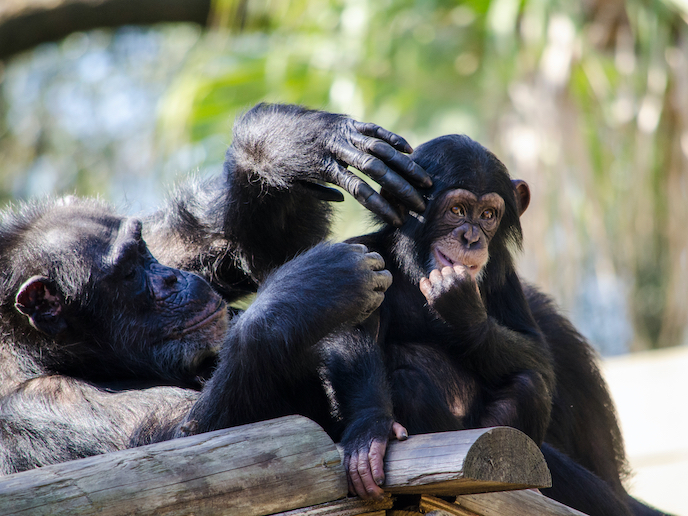What chimps can teach us about social bonding
Mothering styles can significantly influence how children develop social skills, including the formation and maintenance of relationships, even into adulthood. The underlying physical and social processes involved are poorly understood, partly because accurate measurement of social bonding would require continuous behavioural observation, which is both ethically and practically problematic. But chimpanzees offer a solution to this challenge. “Chimpanzees are our closest living relatives with similar brains, physiology and social structures and so good proxies for humans,” explains Catherine Crockford, director of research at the Institute of Cognitive Sciences(opens in new window), CNRS, Lyon, host of the ApeAttachment project, which was funded by the European Research Council(opens in new window). “We demonstrated that humans are not the only species to need parental care for years after weaning, at least until they reach sexual maturity at 12 years old,” adds Crockford.
Data and fieldwork findings
Studies that look at mothering in children usually rely on proxy measures to determine what might influence a child’s social development, such as whether a mother is divorced, resulting in subjective interpretations. The measurements that ethologists, who study animal behaviour, collect about social bonding are more instructive. In chimpanzees, for example, high rates of grooming are known to both promote and reflect strong social bonds. Mother-child dyads(opens in new window) that groom more than others are more likely to share food and support each other in fights. So, grooming relationships offers reliable social support, promoting health and long life. The cohort and longitudinal data that the ApeAttachment team analysed, included data about health, reproductive success and the prevalence of hormones indicative of attachment behaviour, principally cortisol and oxytocin. This was complemented by 2 years of chimpanzee observations in the Côte d’Ivoire Taï Chimpanzee Project(opens in new window) and the Budongo Forest(opens in new window), Uganda, in collaboration with the University of Neuchâtel(opens in new window). Both teams were trained to collect the same behavioural, hormonal and GPS data across five chimpanzee communities. “The researchers would travel several kilometres before dawn to find the chimpanzees. Then for the next 12 hours they followed their focal chimpanzee, either an infant or mother through the forest, collecting data,” says Crockford. Urine samples were collected, as they contain information about the animals’ physiology, including hormone levels. The team used an ‘event sampling’ method of their own design to measure hormone levels associated with particular social interactions, such as food sharing. Chimpanzees that lost their mothers after weaning (older than 4 years) were found to have slower growth rates, with the males producing fewer offspring. These infants also initially had higher levels of the stress hormone, cortisol, though levels returned to normal after a couple of years. Those whose mothers died before weaning rarely survived. “It was a real eye-opener to be reminded that we are not the only species where mothers and mothering play a crucial role well into adulthood,” remarks Crockford.
Biomarkers and conservation implications
The team are currently looking at how the extent of a mother’s nurturing impacts oxytocin levels and social skills in offspring. Oxytocin is a hormone known to be key in building a social bond between mother and offspring. It may be that high levels are associated with increased nurturing behaviour. ApeAttachment’s results suggest that primates, and possibly other mammals, need intact communities if they are to survive. If mothers are trapped or killed, their offspring will have fewer offspring of their own, threatening the species. “These extraordinary animals and their habitats are facing unprecedented pressures and may cease to exist without government action,” notes Crockford.



